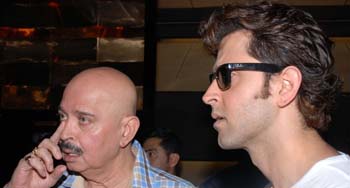New Delhi, Apr 6: A special money laundering court here has attached assets worth Rs 75 lakh of a conman who cheated film maker Rakesh Roshan in 2011 and several others posing as a senior CBI officer.
The court acted on a complaint of the Mumbai office of the Enforcement Directorate (ED) which registered a money laundering case against Ashwani Kumar Sharma and his wife Meenakshi Mansotra taking cognisance of numerous CBI FIRs against him for duping gullible people who wanted to secretly settle their serious cases of penalty and customs duties.
 A comfy flat in Sector-20A of Navi Mumbai worth Rs 26.25 lakh and two plots in Sushant city area of Haryana's Panipat district valued at Rs 15.75 lakh and Rs 31.50 lakh respectively had been attached by the ED last year under the provisions of the Prevention of Money Laundering Act (PMLA).
A comfy flat in Sector-20A of Navi Mumbai worth Rs 26.25 lakh and two plots in Sushant city area of Haryana's Panipat district valued at Rs 15.75 lakh and Rs 31.50 lakh respectively had been attached by the ED last year under the provisions of the Prevention of Money Laundering Act (PMLA).
The case dates back to 2011 as the agencies got on hot pursuit of Sharma and his associate Rajesh Ranjan after Roshan complained to the CBI that the duo has "threatened" him that they, posing as CBI officers, would issue arrest warrants against him, his actor son Hrithik and other family members in a payments case related to their home production Hindi flick 'Kites'.
The conmen, who had cheated numerous people by this time flaunting their fake status as CBI officers, also extracted Rs 50 lakh from Roshan on the pretext of helping him get closed a civil complaint case against the Roshans.
The Adjudicating Authority of the PMLA, in two latest and separate orders, attached the assets in the name of Sharma as "proceeds of crime" earned by creating illegal assets by cheating a number of people who were scared of their status of being CBI authorities.The Authority is a judicial body to decide on cases of enforcement action.
The ED probe found that the assets created by Sharma were "done with the sole intention of money laundering by projecting the tainted money derived out of scheduled offence as untainted in the form of genuine investment."
The case had made headlines three years back as a number of people who were under the scanner of agencies like DRI and the Income Tax department got in touch with the conmen, taking them to be CBI officers, for bailing them out of legal action by these agencies.
As part of its clever planning to nab Sharma and others, the CBI, finding a number of people complaining to it that they were cheated by fake CBI officials and worried over the misuse of its name, had brought out an advertisement in newspapers asking people to send in their complaints if they were cheated in a similar fashion.
The agency booked Sharma and Ranjan under various IPC sections that deal with cheating and conspiracy. The ED later joined in the probe and slapped money laundering charges against Sharma and his wife.
The investigative agencies, while chargesheeting the duo, relied on the I-T returns of Sharma and his wife where they found that the income reflected by them was disproportionate to the assets that they were possessing.
The probe agencies also scrutinised the bank accounts of the couple which reported a number of large transactions being credited in their accounts which the agencies found out were being deposited by the people who were cheated by them.
Sharma is a resident of Panipat and was involved in the business of handicrafts and Pashmina shawls trade before he embarked on the con mission to cheat people by posing as a CBI officer along with his associates.





Comments
Add new comment